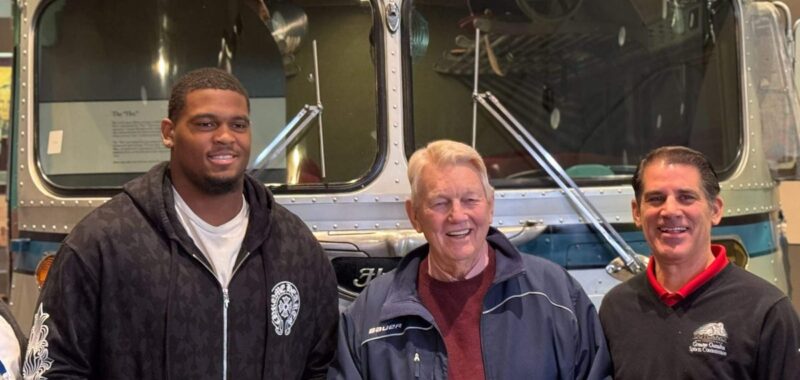OMAHA, Neb. — A history lesson from Charlie McBride, who’s back in the state of Nebraska to receive the Tom Osborne Legacy Award on Wednesday night at the Outland Trophy Banquet: Twice during the final 2 ½ years of his 18-season run as Nebraska’s defensive coordinator, McBride walked into the head coach’s office and declared his plan to retire.
Neither meeting went quite as McBride anticipated, which he recalled during a conversation with The Athletic on Wednesday.
The first, in the midst of an undefeated season in 1997 with a team emotionally led by two of McBride’s all-time greats, Jason Peter and Grant Wistrom, McBride sat down with Osborne and told the legendary coach he was ready to “pull the plug” on his career.
McBride’s joints were failing. He was forced to coach and often recruit while sitting in a golf cart. It was a bad look, he said. McBride said he believed he was cheating the university. Time had arrived to bail out.
But Osborne said no.
“Why not?” asked McBride.
“Well, I’m going to retire,” McBride recalled hearing from Osborne, “and we both can’t leave Frank.”
Osborne promised Frank Solich years earlier that he would step down and hand the job to Solich in 1996. After the Huskers fell short of a third consecutive national championship, Osborne extended his stay by one season.
The details remained a secret to McBride, who’d coached at Osborne’s side since 1977. So McBride agreed to stay for one season. In 1998, with McBride at Solich’s side, Nebraska lost four games in a season for the first time in 30 years.
Much like Osborne two years before, McBride came back for another year. And in 1999, with a dominant defense to ease the strain on young quarterback Eric Crouch, McBride knew the time was right. In October came a second meeting with the boss. McBride told Solich, the second-year head coach, that he would announce his retirement after the bowl game.
Two days before the Fiesta Bowl, McBride reminded Solich of their conversation.
“He said, ‘What?’” McBride said. “He told me I didn’t tell him. I’m like, ‘Holy moly, this guy’s got amnesia or something.’”
Solich perhaps figured he could feign surprise and convince McBride to stay — a wise move. McBride’s group in 1999 ranked fourth nationally in total yardage allowed per game, second in passing efficiency and third in scoring.
That was his best defense, McBride said, led by defensive tackle Steve Warren and stars in the secondary Mike Brown and Ralph Brown. It was better than the 1994, 1995 and 1997 groups that won national championships, McBride said.
He announced his retirement in Arizona in the aftermath of that Fiesta Bowl, a 31-21 Nebraska win against Tennessee, the reigning national champ, and QB Tee Martin.
McBride was 60, the same age as Osborne when he retired. While Osborne went on to serve in Congress and run the athletic department at Nebraska for six years after his coaching days, McBride kept a low profile.
He underwent surgeries to replace both knees, a hip and a shoulder and to insert a pacemaker. McBride said he never considered a return to big-time coaching.
At 85, he doesn’t need a golf cart to get around. McBride looks good and still gabs about football as much as when he coached. During a visit Wednesday morning to Omaha’s Boys Town with the 2024 Outland winner, Texas offensive tackle Kelvin Banks, McBride said the award he’ll receive at the banquet comes with extra meaning “because of who it represents.”
Osborne, 87, is scheduled to attend the Outland banquet and no doubt toast to McBride. They directed the Huskers with efficiency and great chemistry despite their differences in personality.
Osborne coached with a conservative style and rarely deviated from an even keel. McBride showed his passion regularly. His voice rose above others on the practice field. In their 16 seasons together at the helm of the Nebraska offense and defense, the Huskers won 171 games — 13 games more than the second winningest program in that span, Florida State.
Players loved McBride for his fire. He took chances. Nebraska opponents, after McBride moved to a four-man front in the early ‘90s, feared his defenses in a way that exceeded even the feelings generated by Osborne’s methodical, power run game out of the option offense.
“I’m a pressure coach,” McBride said. “I love pressure.”
In McBride’s final seven seasons, Nebraska won 81 of 89 games, including bowl victories against Miami, Florida, Virginia Tech and Tennessee (twice).
It was a time far removed from the new 12-team College Football Playoff. Ohio State, in a 30-day stretch that came to an end Monday, beat Tennessee, Oregon, Texas and Notre Dame to win the national championship. The Buckeyes’ run to reach the top rates possibly as the most impressive in college football history.
McBride said his Blackshirts would have held up well under the kind of stress that Ohio State faced in December and January.
Why? Because of how Nebraska applied pressure with its defense.
“This would have been a better (format) for us,” McBride said. “Pressure is really one of the only ways to hurt the offenses today. If you can get to that quarterback fast, you’re doing your job. The way we did it, we would have been fine.”
(Photo of McBride (center) with Outland Trophy winner Kelvin Banks of Texas and Bob Mancuso of the Greater Omaha Sports Committee: Mitch Sherman / The Athletic)

